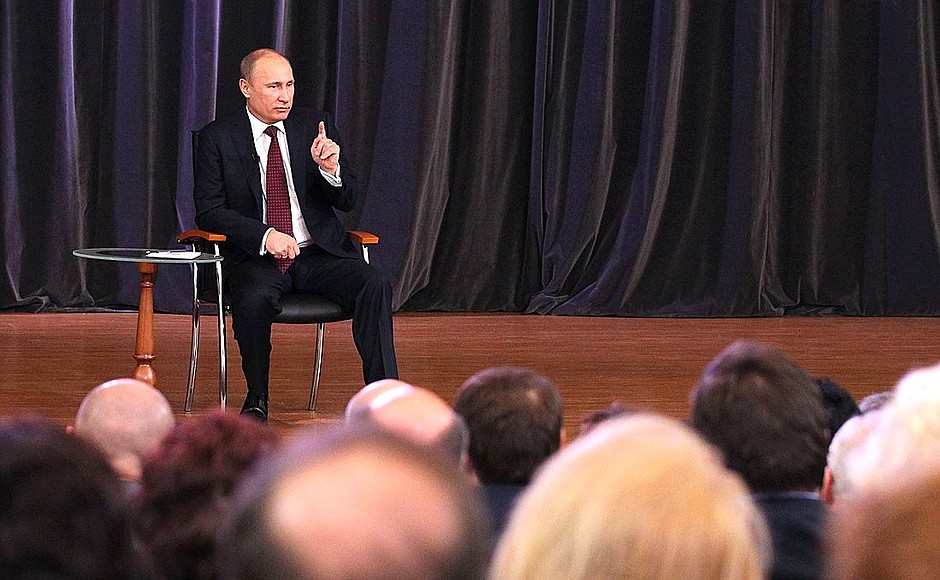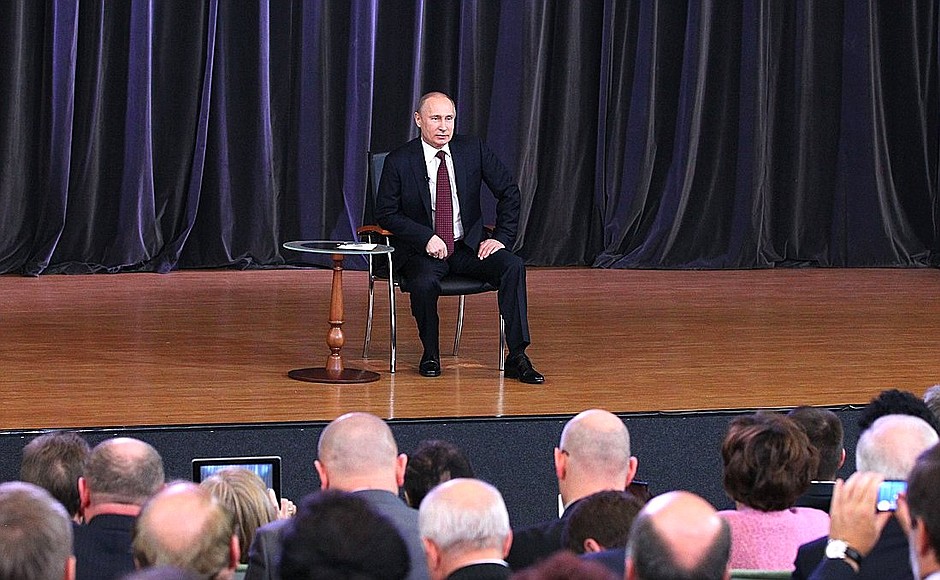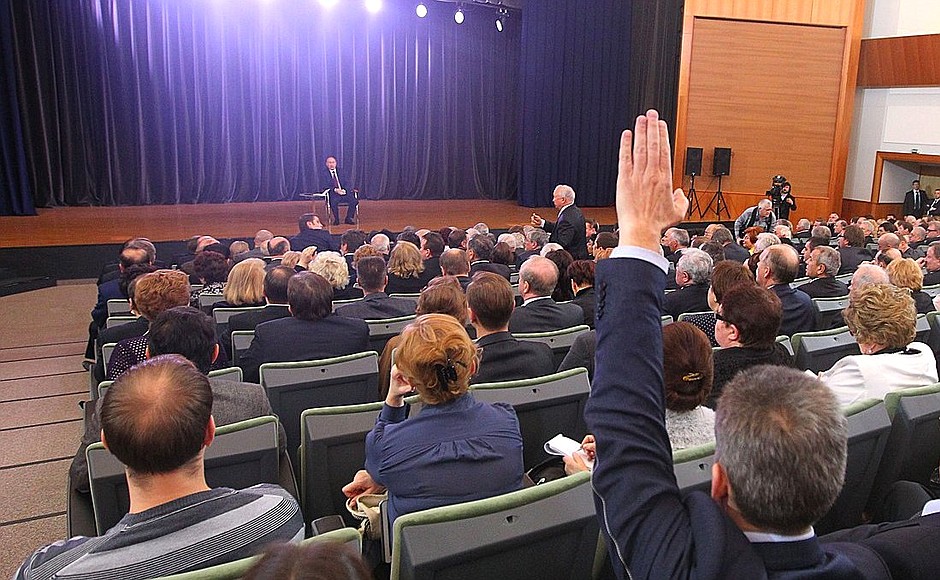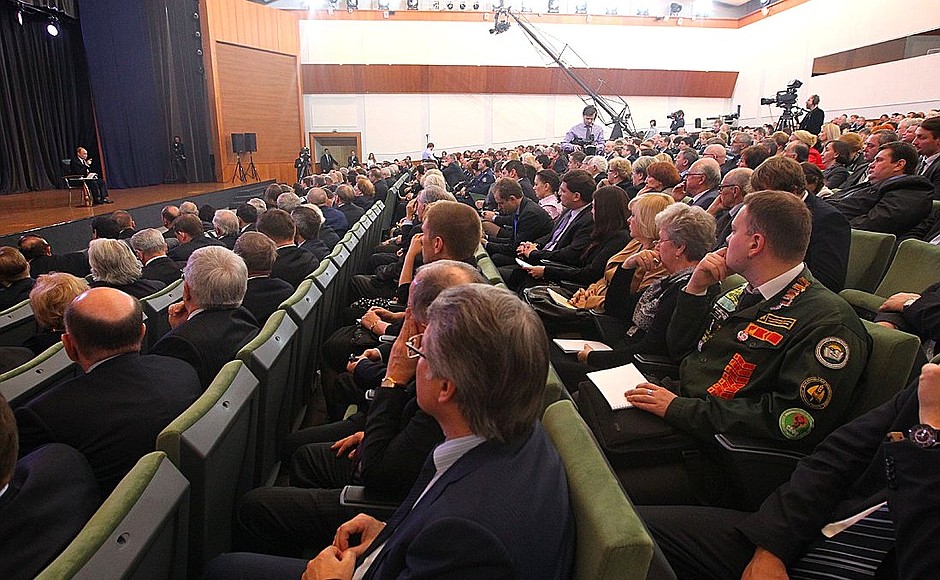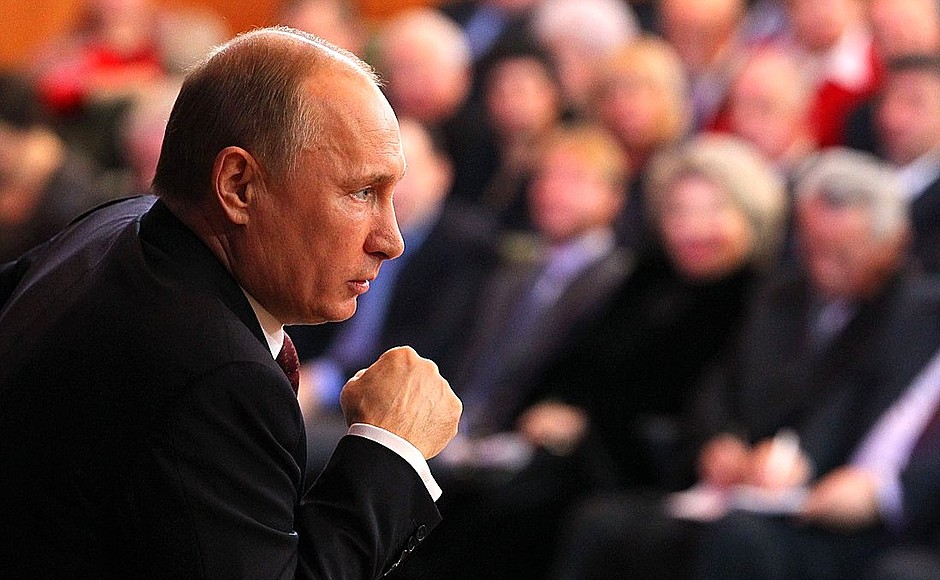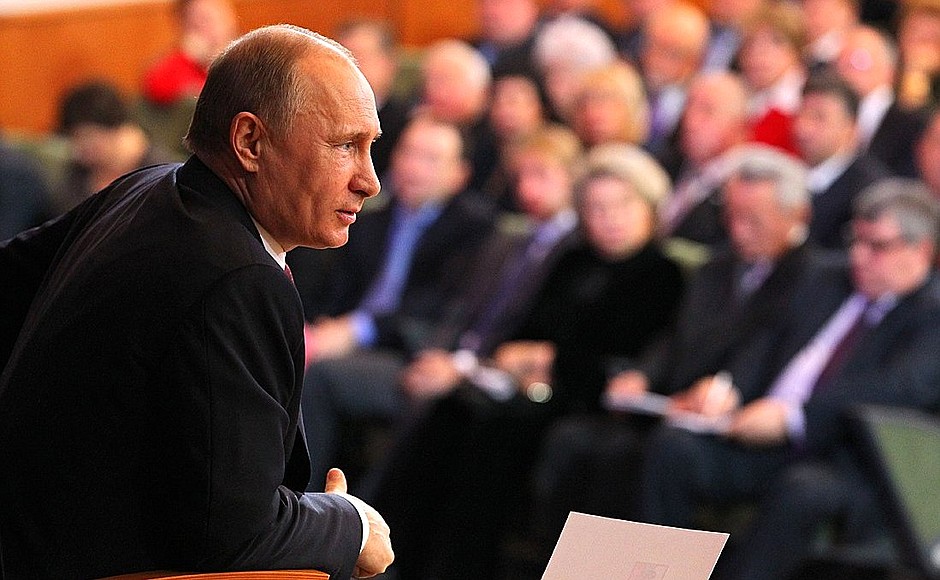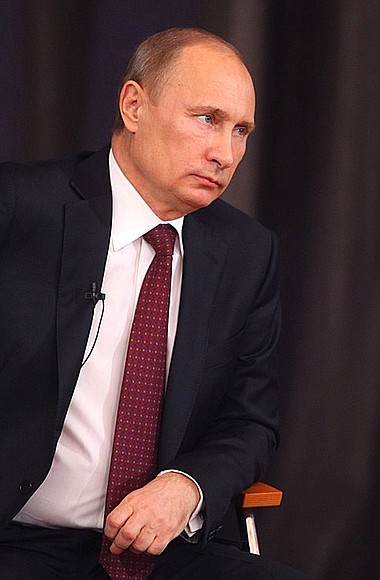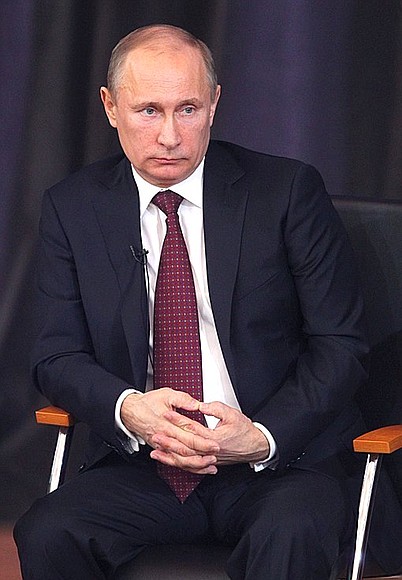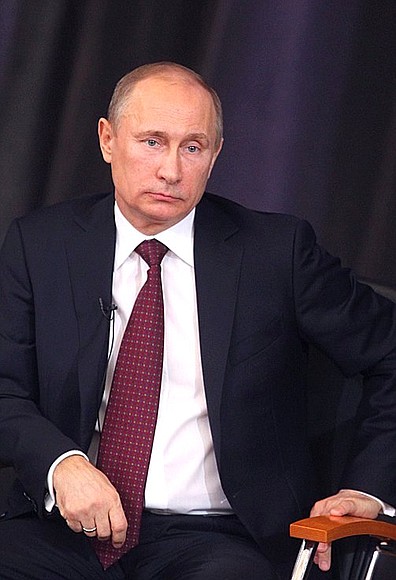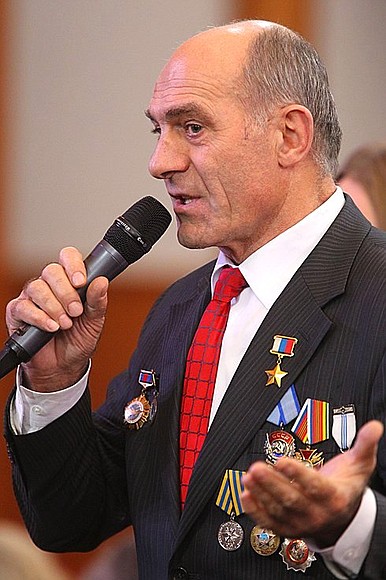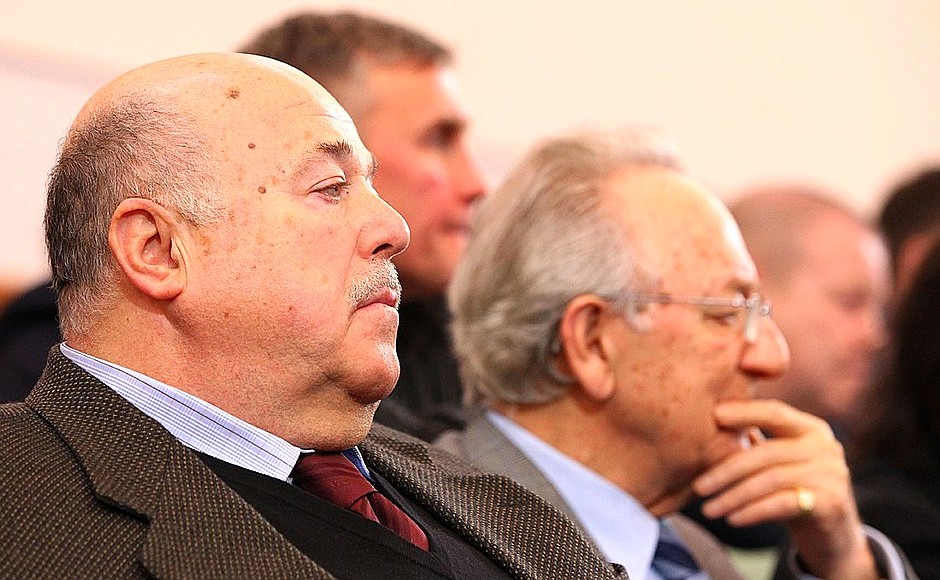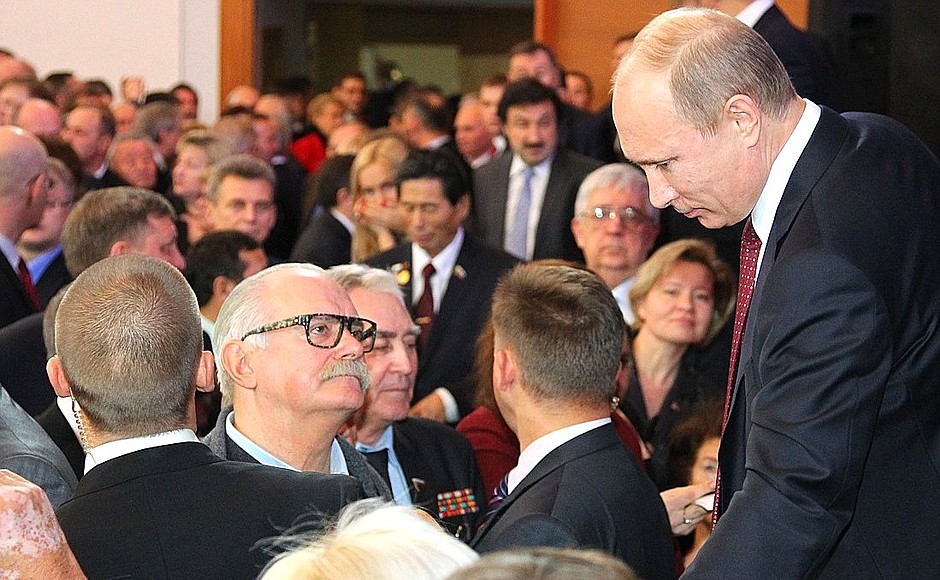This was Mr Putin’s first meeting since his inauguration, with the group of campaign activists. Previously, such groups were only operating during the election campaign period.
The group of activists met the previous day with officials of the Presidential Executive Office, Government, and Federal Assembly to discuss implementation of the goals and programme Mr Putin set out in his election campaign articles and his executive orders of May 7, 2012.
The group of official campaign activists brought together some 550 people from all around Russia, including representatives of public associations, intelligentsia and arts communities, prominent scientists, sportspeople, journalists, doctors, and people from other fields.
* * *
Excerpts from transcript of meeting with election campaign activists
President of Russia Vladimir Putin: Good afternoon, friends and colleagues.
I address you as colleagues because we really did work together for a common cause during the election campaign, and it is above all to thank you for this work together that I have invited you all to today’s meeting.
We made no mistakes in our choice of campaign activists. You are all recognised figures in your professions, your work teams, and the regions where you live. You are not only recognised figures but are respected people who have achieved big results in your areas of activity. Of course people value your opinion. I am very much aware of this and I thank you for giving me your support. Thank you very much.
The election campaign was a big milestone in my own life of course, and I imagine it was an important event in your lives, seeing as you took part in it too. But even more important is what is to be done after the election campaign is over. This is the case with our campaign, and indeed with any election campaign all around the world.
During our joint work we outlined a very ambitious programme for Russia’s continued development. The documents drawn up during and after the campaign were to a large extent based upon your opinions too. I am sure that if you read my articles and the executive orders issued in May – and I’d like to think that you did read them – you could not fail to have noticed that they reflect your ideas and views too. Probably not everything has found its embodiment there, but I did try to take into account the main ideas and points that you expressed.
“The top priority now is to carry out in practice the main goals we set for Russia’s short and medium term development and for the strategic future. This is the biggest task before us today, and we all share collective responsibility for this programme.”
The top priority now is to carry out in practice the main goals we set for Russia’s short and medium term development and for the strategic future. This is the biggest task before us today, and we all share collective responsibility for this programme, and this is why I invited you all to come to Moscow for this meeting today.
What is my objective in holding this meeting? It is something different, something we have never tried before, but I want to keep this big team together. I want to keep this team together in order to be able to meet with you at least a couple of times a year to update each other and go over the work done. Of course, with more than 500 people this makes for a team where people have all sorts of different views, and this goes for political views too, but this is a good thing because it gives us the chance to examine issues from all the different angles. It gives both me and you the chance to look at what is taking place, what is actually going on in the country, what we are trying to achieve, what results we have obtained, what is not working and why.
It is my hope and my request to you today that we will continue this work over the coming years. For objective reasons we will not be able to meet often and there is no need to try, but I think that a couple of times a year would be perfectly realistic.
Furthermore, many of you are involved in one way or another in the Russian Popular Front, and so I think it would be possible to have you join in the Front’s work, not at the general level, but in your relevant areas, in the relevant sections on science, the arts, education, the economy, military affairs, military reform and so on. I will ask my colleagues in the Presidential Executive Office to help with this.
In other words, I want to get you involved in the day-to-day work, and I want to meet with you a couple of times a year in this broader format to exchange views on what is going on in the country as a whole or in particular regions or sectors.
I will end my opening remarks here and give you the floor. Please, go ahead.
<…>
Vladimir Putin (responding to remarks by test pilot Magomed Tolboyev): First of all, concerning the development of short distance local aviation, this is something we discussed at the last meeting, and I fully agree with you here. We have this vast country and a road and rail infrastructure that is still underdeveloped, and so of course we have to develop all of this, including local aviation. In many places planes, above all these small aircraft flying local routes, are the only form of transport, and of course we are to revive this sector. This is why I said in my opening remarks that a lot of your proposals were reflected in the documents and presidential executive orders issued subsequently. You made this proposal at our last meeting and it was included in one of our recent decisions.
“We must revive local aviation, but we should do so using our own industrial capacity. Of course we could use modern high-tech solutions and draw on other countries’ experience, but production should take place here in Russia.”
But I want to make my position clear from the start. I do not recall now if I said last time or not that we must revive local aviation, but we should do so using our own industrial capacity. Of course we could use modern high-tech solutions and draw on other countries’ experience, perhaps even get them involved, have their capital and technology join our projects, but production should take place here in Russia.
We get many proposals to set up assembly plants here. In other words, we would simply receive all of the main parts and then put them together and have them fly. It sounds like a decent enough idea, but if we take this road we will never build up our own skills and capability, and these are the things we desperately need. And so we have to take the road that has worked quite well for us in the automotive industry. We should invite foreign participants to join in our projects with their capital and technology, but under condition of increasing localisation, that is to say, building up production here on Russian soil. This is the road we should take.
On the matter of the Hero of Labour title, I think everyone realises that your work was such that it deserved to be recognised with a decoration, and you thus merited the title of Hero of Russia. It does not matter that your merits were not in combat, but your work was a dangerous labour and in that sense was little different from combat. Overall though, I think the title you mentioned – Hero of Labour – could be worth reviving. We would have to think about it first though, because we cannot simply copy the Soviet-era decoration. We would all need to reflect together on the issue, discuss the idea with public groups and society in general. There would need to be clear criteria. The decoration would be awarded not simply for length of time worked, but for results achieved, for the contribution made to our country’s development. If we come up with clear criteria in this area I think it would be possible to revive the Hero of Labour title.
Let’s take it as a decision made. I think that you have formulated very clearly the main objective – the need to give greater recognition to people’s work, no matter in what field, no matter whether we are talking about ordinary workers, engineers, academics, people working in science or the arts, or civil servants, those who work with their heads and those who work with their hands – all require greater attention. The moral encouragement also plays a big part in this respect. This is something we are to address in general as a separate discussion.
<…>
Writer Eduard Bagirov: We all know that an anti-corruption campaign is now underway, and attention in the Internet is all on it.
Vladimir Putin: It isn’t a campaign.
Eduard Bagirov: Oh, it isn’t a campaign? So what is it called?
Vladimir Putin: It isn’t a campaign but is our policy of countering corruption, a long-term combat focused on positive results.
Eduard Bagirov: Alright, let’s call it that.
“I think it would be possible to revive the Hero of Labour title. The main objective is the need to give greater recognition to people’s work, no matter in what field, no matter whether we are talking about ordinary workers, engineers, academics, people working in science or the arts.”
I will be brief. I want to put to you your own question from the Internet: when will we see people going to prison, Mr President?
Vladimir Putin: Going to prison? Ah, the things one can say in the heat of the moment. Of course we are all fed up with what we see happening at moments, and of course people should go to prison for these things, and they do too, quite a few in fact. The issue is not the harshness of the punishment, however, but making sure that it will be inevitable. Any lawyer would tell you this, and this should be our main objective. I want to stress the remark I made just before: this is not a campaign. We must carry on a consistent fight to suppress and eradicate corruption. Of course, the corruption problem did not just pop up overnight, and Russia is not the only country facing this challenge. This is always a difficult issue in general in transition economies when not all of the market demands and regulations on the different market and social actors have been clearly laid down yet, but it is a problem that can be solved. We are to fight corruption not just at the top levels of power and not talk about what is going on in the Defence Ministry alone. We should be aware of the things that worry people on the streets of their own towns and villages too, when particular agencies’ employees extort money from them, for example. We must not ignore either what is happening in the social sector. It is sad to have to say it, but we have problems of this kind in education and healthcare and so on too. We must keep all of this in mind and have to work at all levels and in all areas. We will do this without fail.
I am certain that the vast majority of you support me here. Yes, we need to be tough and consistent, but we also have to act solely within the law. This is a complex case for the investigators and for the courts. They must act professionally, competently, and see the case through to its final verdict. I make this point because many corruption cases and cases related to the economy in general are quite complex in terms of gathering evidence and so on, but the courts cannot pass a verdict simply because, though we might not have the evidence to prove it, we all believe that so and so committed a crime. Taking this road would return us to 1937. That is the issue here.
<…>
Vladimir Putin: We are living through times of change when the global economy is gaining a different structure and new global economic leaders are emerging. Primary among these are the BRICS countries: Brazil, Russia, India, China, and South Africa.
The Asia-Pacific region is developing at a rate that gives us every reason to expect a change in global economic leadership over the next decade and this will inevitably lead to changes in different countries’ international political influence too. The experts all long since agree that this is going to happen. The question is only one of when the change will come, whether the current leaders will be in for a ‘hard’ or ‘soft’ landing, what will come next, and how will the new leaders behave? Of course Russia must ensure it is a part of this transformation and establish and consolidate its place.
“Russia is to find its place in this global geopolitical transformation. We must achieve this through modern methods and not through confrontation. We must promote and protect our national interests, but we should be aware of and take into account our partners’ interests at the same time.”
What we see is that Russia has most certainly become stronger and more influential over the last 15 years. This is a clear fact. This does not mean that we should dictate or lobby our interests at all costs at other countries’ expense. But there are many problems that cannot be resolved without taking into account Russia’s views and without Russia’s effective participation. This might not be to everyone’s liking, but really, it is a perfectly normal thing. It is one matter after all to decide things on one’s own without asking anyone else’s opinion, and quite another to consult with others and take their views into account. This kind of situation can rub others the wrong way and often makes our partners start looking for instruments that would enable them to pinch and squeeze Russia here or there so as to make us more compliant in some other way.
All kinds of stereotypes get called into play: we haven’t completely cast off our communist past yet, our democracy is still lacking, our elections are called into question, our legitimacy isn’t up to standard. Doubt gets cast on everything. And if we have no legitimacy here after all, what right can we possibly have of expressing our foreign policy views somewhere else? What can someone with no residence permit possibly say about Tchaikovsky’s music? This is their logic! (Laughter).
But this is all becoming a thing of the past. I always said that some might think that the world became a unipolar place, but this is not the case. It was not the case 15 years ago and is certainly not the case today. There is probably no one now who would assert that we live in a unipolar world. Ours is a multipolar world and is becoming more so all the time. Russia is to find its place in this global geopolitical transformation. Can we do this? Of course we can, with the help of our vast territory, our traditions, and our growing economic and military power. But there is no question that we must achieve this through modern methods and not through confrontation. We must promote and protect our national interests, but we should be aware of and take into account our partners’ interests at the same time.
<…>
Vladimir Putin: On the Customs Union, the whole world is taking the integration road today. There’s no need to give the example of the European Union, where, as I already mentioned, the number of binding decisions passed by the European Parliament is bigger in percentage terms than the number of binding decisions passed by the former USSR Supreme Soviet for the entire Soviet period. Such is the degree of integration in the EU.
True, the EU has its problems too, and quite big ones. Many experts think that they tried to go too fast without first sufficiently regulating macroeconomic issues and coordinating currency policy and so on. But the whole world is integrating. North America has the group bringing together Canada, the USA and Mexico. Southeast Asia is integrating. Everyone is doing it. I find it very strange when some foreign colleagues say that our integration plans are about Russia’s ambitions to restore the former Soviet Union. This is nonsense! We see this integration as an absolutely natural process. It is natural because we have something that other integration groups do not have: we have a common language, the great Russian language. We share a common mentality in many ways because we all emerged from a single country. We have a common transport and energy infrastructure. We have cooperation between important economic sectors on a scale that simply cannot be compared with what other integration organisations have achieved. Our cultures share many common points too. All of this means that integration will without question make us more competitive.
<…>
“We must return to our historic roots. We must work on educating our youth, on teaching them patriotism based on our traditional values, but of course also bring them up as modern individuals, striving toward the future.”
Vladimir Putin: Let me make a brief digression and tell you a little story. It’s a bit awkward to talk about myself, but I will tell you anyway. It was in St Petersburg quite a long time ago, sometime at the start of the 1990s. I was leaving the Philharmonic Orchestra hall after a concert. There was a big crowd as I came out. There was a not very tall man next to me and we exchanged a couple of chance words. There’s this marvellous statue of Pushkin on the Arts Square in front of the concert hall, and as we came out I turned to the man beside me and said, “What a wonderful piece of work that is. How beautiful it looks!” It was all wonderfully lit up as well. The man beside me said, “Yes, I’m very proud of it. It’s one of my best works.” He was the sculptor Mikhail Anikushin. I was stunned. I thought he was one of our legendary classics. Well, he is one of our classics of course. But anyway, it is really a wonderful thing that we have such sculptors and artists among us today.
<…>
Vladimir Putin: On the question of defence reform and what will happen with it, I want to draw to your attention that the main reform guidelines were set back in 2005, before the former defence minister took his post. Our premise then – and which remains relevant today – was that the armed forces should be more compact and meet a number of set standards. Of course our armed forces must be able to ensure our country’s security and be affordable for our economy. We must not repeat the mistakes of the Soviet period, when no one kept count on the resources being pumped into resolving defence needs and people ended up getting soap and sugar on ration cards as a result. We must not let our economy and social sector end up in this situation because people would start to wonder what kind of country they are living in and what the whole point is of these policies. That is the problem. And so we must be very careful with our defence spending, which we have already pushed to the limit.
As you know, there was a lot of active debate recently, including within the Government itself. Things even reached the point of resignations. We are to be aware of what is happening in the economy, in the world, and in our country. In this context, the reforms should continue based on the main conditions and guidelines that were set in 2005–2006. The top priority for our upcoming work should be to raise the social status of military personnel and give them better financial conditions and incomes. Completing the work on providing them with permanent housing over the next year is also a very important matter, and then we should in 2014 or 2015 settle the matter of providing everyone with service housing. This work must be completed. We also have to continue efforts on improving training and combat exercises. You know that our strategic aviation has resumed its patrols and our submarines are sailing the world’s oceans. Our ground forces are also holding exercises and conducting training. This must continue. We need high modern professional standards in our armed forces.
Finally, we should continue the re-equipment programme. Huge sums of money – 20 trillion rubles plus 3 trillion [$700 billion] for the defence industry – have been earmarked for this programme. This work must be carried out in accordance with the highest standards. The money that is being invested in our industry must be spent effectively. We know where our priorities lie. Our priorities are the nuclear deterrent forces, intelligence and communications, air and space defence, and high-precision weapons. These are all priorities and the work here must be carried out and our goals achieved.
But it is another matter that we should act in modern fashion. We always are to be aware of what is happening in the military field in general and react to the changing situation in our country and the world in timely and sensitive fashion. I hope very much that the new defence minister, with his skills and experience, will have the political wisdom to carry out these tasks successfully.
<…>
Vladimir Putin: As far as the protest movement is concerned, nothing unusual occurred in our country. All nations see an increase in civic activity during election campaigns, including protests. The processes happening during the State Duma election generated the most heat, while even the harshest critics believe that your humble servant won in the first round. There is some debate regarding what percent of the vote I had, but nobody doubts that I won in the first round.
As for the State Duma election, there were many more issues and complaints. But, I repeat again, they increased and peaked during the electoral campaigns, which is what happens in any country in the world.
Furthermore, I do not think that the decrease in this type of activity is related to any kind of repressive measures, although I have always said and can say it again: I believe that any citizen of the Russian Federation has the right to express his or her opinion and to fight for it by any lawful means available. I want to emphasise that again: lawful means since this is highly important. I do not think such interpretation may be seen as being repressive.
I think that there is another consideration that naturally affects people, including the protest movement participants. Ultimately, I think people have come to realise that the overwhelming majority of our nation’s citizens do not want any revolutions. The majority of our people certainly want changes, and the sooner the better. No doubt, they want changes for the better, yet nobody wants a revolution as we have already had enough revolutions in our past.
Moreover, we see what is happening in other countries around the world, what happens to nations undergoing mild transformations, and what conditions they are subsequently in. Let alone the situations in the states where revolutions have occurred but can never end and have resulted in an absolute destruction of the economy and the social services. That is what is happening there where every day people are dying in the streets.
Nobody wants to see that here so, as far as I can tell, the majority of our people view the situation with concern. As I frequently travel around the country, I have a sense of what people are feeling. The participants in the protests in Russia were also under influence of the global situation since, after all, most of them are intelligent people.
Yet another consideration. I have met many average citizens who say, ‘Why are they protesting? If things get really bad, they’ll get on a plane and get out; in any case, the sponsors of the protests will. As for us, we have to live here.’ Nobody wants major disturbances. I am certain that everyone feels this way.
But that’s not all. You mentioned the political measures being taken, and I have to agree. Look, just recently, we had seven parties. Now, we already have 25 or 26. We have passed laws that significantly liberalise this area of political activity. You know how many organisational groups and associations for creating new political parties have popped up in our country? Two hundred. In other words, people – even those who are very opposed to the current administration – now have an opportunity to legalise their activities, to get involved in direct political activities in the literal sense of that word – to create a political organisation, a party, to compete for voters. I think that this, too, has had a great influence on the decline in protest activities. I hope that our critics and the participants in this protest movement will also engage in positive work based on the opportunities provided by the laws recently passed in this respect.
<…>
Vladimir Putin: This is a very important and sensitive issue. We have more than 10 million disabled individuals; these are our citizens, and although they may have some health-related problems and certain limitations [in self realisation], they are not any different from our other citizens. The main problem, and I am constantly working on this, is providing them with jobs as they all want to work. It is only a question of offering the right conditions. It is an economic and social issue, as well as a moral one. I am not going to engage into the details now, because it is multidimensional. The previous Cabinet worked on this matter actively, and I hope that the current Cabinet will give it constant attention. Under no circumstances will we let this issue go without government attention.
Moreover, we are in touch with organisations for people with disabilities and we will continue to be in direct contact; we will engage them in dialogue, identify the most sensitive issues and, of course, react appropriately.
<…>
Director of the Moscow Variety theatre Gennady Hazanov: We were just speaking about disabled individuals in Russia. In my view, Russia faces a major threat of an increase in disabled people – not physically, but morally disabled. I would like to say that the sharp increase in aggression within our society is greatly fuelled by the media.
Frankly, with the exception of two federal television channels that are still using a fairly sensible system in this respect – I am referring to Channel One and Rossiya – all the others that I am seeing, in my opinion, push our Russian citizens, particularly children, toward becoming morally disabled.
Vladimir Putin: Yes, we do have that problem. Of course, it is multidimensional and is due to many factors, including the loss of certain reference points.
After all, what happened after the fall of the Soviet Union and its prevailing ideology? We did not gain anything new in its place. Incidentally, and although perhaps our left-leaning colleagues may argue with me, even the communist ideology took its main principles from the world religions.
What was the Communism Supporter Code about? It declared the same principles as the Bible or the Koran – do not steal, do not kill, do not covet your neighbour’s wife. It is written in and borrowed from those texts.
Many people argue about the Lenin’s Tomb, saying that it does not follow tradition. What does not follow tradition? Just visit Kiev Pechersk Lavra or go to Pskov Monastery, or Mount Athos. You will see hallows of holy people there. Go ahead, you can see it all there. Therefore, the communists continued the tradition even in that respect and did it competently, in accordance with the demands of those times.
But we must return to our historic roots. We must work on educating our youth, on teaching them patriotism based on our traditional values, but of course also bring them up as modern individuals, striving toward the future. Then, a great deal will change on the television channels themselves. Although, of course, the mainstream media must fight not only to increase their ratings and advertising minute prices, but also to assure an educational influence on its viewers. You are right.
* * *
Colleagues, I know that we could talk until next morning, because we have oceans of problems in the country, in various industries and regions you represent. So we will continue this work.
Thank you very much.
I will be making my Address to the Federal Assembly in a few days and will certainly raise the issues we discussed today in my Address to the Federal Assembly.
